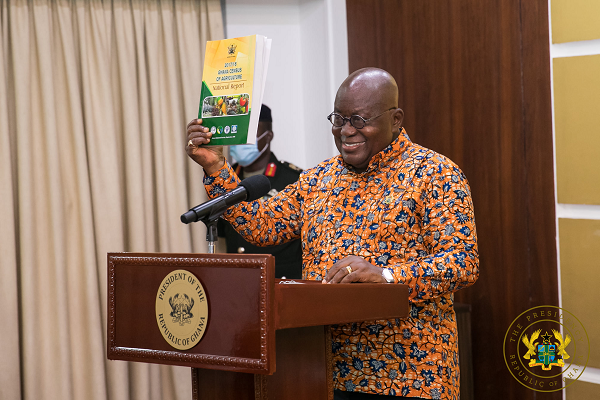
2017/2018 Agric Census Report launched
President Nana Addo Dankwa Akufo-Addo has launched the 2017/2018 National Report of the Ghana Census of Agriculture.
The report will help provide a basis to monitor the progress of government’s interventions in the agricultural sector, offer insights on the transformation of the sector and ensure the integration of the agricultural, industrial and services sectors.
Although such a census must be done every 10 years, this is the first time in 33 years that it has been conducted.
The only times the census had been conducted were 1963, 1975 and 1985.
Launching the report, President Akufo-Addo noted that the importance of agriculture to Ghana’s growth and development demanded that data on the sector, which informed the formulation of strategies and policies, as well as the monitoring and evaluation of such policies, must be accurate and up-to-date.
He described as shameful the fact that for over three decades the census had not taken place, intimating that, prior to his assumption of office, policies on agriculture had been based largely on guesswork, saying: “It was no wonder that this period witnessed the systematic decline of our agriculture.”
The President launched the Ghana Census of Agriculture in Sefwi Wiawso on June 8, 2018 as part of his working visit to the then Western Region.
Report findings
Reading out some of the findings of the report, President Akufo-Addo said from the statistics, there were 2,585,531 agricultural households in the country, with a population of 11,340,947, and that women made up 50.5 per cent of the population, with 49.5 per cent being males.
He said it showed that the sector remained unfriendly to special interest groups, including persons with difficulty in performing activities and women, the level of education among agricultural holders was low and the sector, to a large extent, was characterised by the consumption of its own produce.
Also, the report indicated that agricultural activity in the country remained mainly rural (75.2 per cent) and rudimentary, with little innovation and modernisation.
He added that the use of modern tools and equipment, such as tractors, shellers, power tillers, hatchery/incubators, meat processing equipment and milking equipment was negligible; tractors were the most used, yet the least owned equipment; fertiliser was not used by most holders; the use of pesticides was highly prevalent among holders and crop cultivation was predominantly dependent on rain.
Also, from the report, majority of parcels of land used for the cultivation of crops were smaller than two acres, with the youth, generally, finding agribusiness unattractive.
Importance of agriculture
“From these results, it is clear that agriculture continues to be the anchor of the country’s economy. The data also point to the fact that production methods are not modern and income levels of farmers and fisher folk remain low, making the sector unattractive to the youth as a viable means of livelihood,” President Akufo-Addo said.
He said it was for that reason that, in the last three years and 10 months, through the Planting for Food and Jobs (PFJ) initiative, “we have begun to change the narrative by modernising agriculture, improving production efficiency, achieving food security and guaranteeing profitability for our farmers, all aimed at significantly increasing agricultural productivity”.
He said the government, through the Ministry of Food and Agriculture, was pursuing a value-addition strategy aimed at rapidly ramping up agro-processing and developing new and stable markets for our produce.
“The PFJ has not only increased substantially the production of maize, rice, soybean and sorghum and transformed our nation into a net exporter of food but has also created some two million direct and indirect jobs,” the President emphasised.
Value of census
The Minister of Food and Agriculture, Dr Owusu Afriyie Akoto, said it was common knowledge that globally, countries with thriving economies had relied on quality, reliable, comprehensive and timely statistics for the planning of the development interventions.
He indicated that the United Nations and other relevant international organisations, through numerous resolutions and conventions, had advocated commitment to evidence-based decision making in pursuit of all development interventions.
He stressed that the lack of consistent information contributed to ineffective planning in Ghana’s agricultural sector over the years, noting that following a comprehensive diagnosis of the sector, the government identified, among others, the need for an agricultural census as a matter of urgency.
Dr Akoto said the value of conducting the census was to provide the basis for tracking the performance of the government’s flagship agricultural programme, Planting for Food and Jobs, and other sector interventions to accelerate agricultural development.
